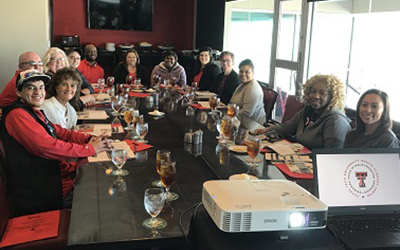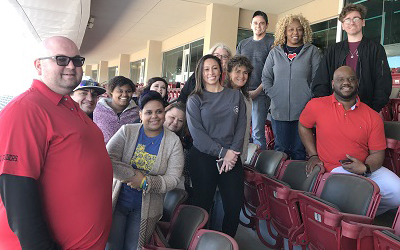Substance Abuse Counseling
Are you a compassionate, willing listener who is ready with support or a kind word during a difficult time? If so, Midland College can give you the training you need to provide counseling and other specialized services to individuals and families suffering the devastating effects of substance abuse.
Chemical dependency is a problem taking an enormous emotional and financial toll on society. While this is an unfortunate issue, the positive aspect is there are exceptional individuals like you, who are determined to help those touched by substance abuse move forward. This program will prepare you to become a vital part of the solution.
Program Details
Select Links Below for Details
At Midland College, the Associate of Applied Science (AAS) degree Substance Abuse Counseling (SAC) prepares a student for a career in substance abuse counseling.
A substance abuse counselor is a type of mental health counselor who treats patients suffering from drug or alcohol dependency. They may also treat individuals who are concerned they are abusing drugs and alcohol in a way that might lead to addiction. These mental health professionals will work with both the chemically dependent client and their family to find coping strategies and plans of action to foster success for everyone. Family involvement can be an important part of the recovery and healing process.
The associate of applied science (AAS) degree in SAC is a technical program designed to prepare the student for a career in substance abuse counseling. The AAS takes about two and one-half years to complete and the certificate takes about a year and one-half to complete. The Texas Department of State Health Services requires the minimum of the AAS to become a fully licensed chemical dependency counselor; the certificate plan is designed for the student who already possesses a completed college degree or is for the student who desires to start working in the field relatively quickly and plans to complete the degree while simultaneously working in the field of addiction counseling.
In the courses required for graduation there is a heavy focus on why people develop addictions and how to help them to overcome addictions, as well as the effects of addictions on the family and other loved-ones. Students are highly engaged in the learning process in each course offered. The professors in the SAC program seek to make personal connections with the students while making the topics of lecture realistic through linking the material with real-life content.
Addictions, the causes of addictions, understanding addictions, understanding addictions in relation to mental health, and how to help people free themselves of addictions are a main focus in the SAC program. Students learn about the theories of how the personality develops, theories of how to help people, evidence-based approaches to substance abuse, the realities of psychotropic substances and the effects these substances can have on the afflicted individual, as well as families and friends, is also of focus. Multicultural education is emphasized; while there are no cultures that are free from addictions, gaining deeper knowledge and insight into a variety of cultures and ways to help individuals from various cultures is presented.
The SAC Program offers a wide array of courses that prepare the student for a career in counseling addictions, as well as preparing them for four-year programs.
During the capstone courses, the students will learn to apply the 12 Core Functions of the Substance Abuse Counselor and gain practical experience counseling in a supervised setting.
Counseling has the ability to change an individual's life. Pursuing a career as an LCDC can be most rewarding, as well as challenging.
Gain Experience
- 300 Practicum - Guided feedback to perform actual counseling tasks:
Practicum sites- MMH-ER; Permiacare, Cloverhouse, Springboard, Adult Probation - Scenario and role play in classroom settings
- Small classes for a learning environment
- Can work as a residential monitor or counseling intern BEFORE graduation
Further your education
- Have articulation agreements with Texas Tech, UTA and UTPB for bachelors level degrees
- Universities with online options for completing 4 year degrees, accepting full Accreditations and up to 90 hours from MC.
Marketable Skills
Training in our Substance Abuse Counseling program can provide the skills you need to jump-start your counseling career. The program reflects a building-block approach from simple to complex marketable skills, covering:
- Social Perceptiveness - Understanding people's reactions
- Active Listening - Listening to others, not interrupting, and asking good questions
- Speaking - Talking to others
- Critical Thinking - Thinking about the pros and cons of different ways to solve a problem
- Service Orientation - Looking for ways to help people
- Judgment and Decision Making - Thinking about the pros and cons of different options and picking the best one
- Active Learning - Figuring out how to use new ideas or things
- Writing - Writing things for co-workers or customers
- Reading Comprehension - Reading work-related information
- Persuasion - Talking people into changing their minds or their behavior
- Monitoring - Keeping track of how well people and/or groups are doing in order to make improvements
- Negotiation - Bringing people together to solve differences
- Complex Problem Solving - Noticing a problem and figuring out the best way to solve it
- Coordination - Changing what is done based on other people's actions
- Instructing - Teaching people how to do something
- Science - Using scientific rules and strategies to solve problems
- Learning Strategies - Using the best training or teaching strategies for learning new things
People in this career often know a lot about therapy and counseling, psychology, customer
and personal service, and sociology and anthropology.
Career Opportunities
Substance Abuse Counselors work for:
- Hospitals
- Rehab centers
- Outpatient clinics
- Veteran’s affairs clinics
- Alternative schools
- Research facilities
- Pain management clinics
- Counseling centers
- Employee assistance programs
- School districts
- Treatment centers
Demand
The demand for SAC Counselors is climbing. According to the Bureau of Labor Statistics, employment of substance abuse, behavioral disorder and mental health counselors is projected to grow 23% through 2026.
Texas Tech Health Care Management Bachelors of Science Degree
Texas Tech University Health Sciences Center accepts the Associate of Science Degree
in Substance Abuse Counseling from Midland College. With an additional 30 hours of
specified MC core classes and the completion of 30 hours online of Texas Tech courses,
students may earn the TTU Health Sciences Center Bachelor's Degree in Health Care
Management.
Students will be advised by faculty on courses that best fit the requirements.
 |
 |
MC students visiting Texas Tech to explore their options through this program.
SAC Departmental SCHOLARSHIP
SAC students may apply for a departmental scholarship. Contact the SAC Program Chair for more information.
To be considered for a scholarship, please follow the link below:
Visit the course catalog for the most complete and up-to-date information.
PLEASE NOTE: Completion of Midland College degrees and/or certificates does not guarantee eligibility to take a certification/registry/licensure examination. The eligibility of each person is determined on an individual basis by the regulatory body of the specific discipline. If you have a conviction of a crime other than a minor traffic violation, physical or mental disability/illness, hospitalization/treatment for chemical dependency within the past five years, current intemperate use of drugs or alcohol or a previous denial of a licensure or action by a licensing authority, you will need to contact the specific regulatory body for an individual ruling. Some programs require a criminal background check and urine and drug screen.
Licensing body for this program: Texas Department of State Health Services
What our Students Say...
|
– Kambri Roland
– Bridget Brewster |
- Anonymous
- Shaun Ellis |
ContactDepartment ChairStephanie Shelton, LPC Faculty |
Division OfficeHealth SciencesDavidson Family Health Sciences Building |
Related Programs |
Related Resources |
Apply to MC Now
Thank you for choosing Midland College! If you are here to collect a few credits, take courses to transfer, or here to start a new career, we welcome you.
